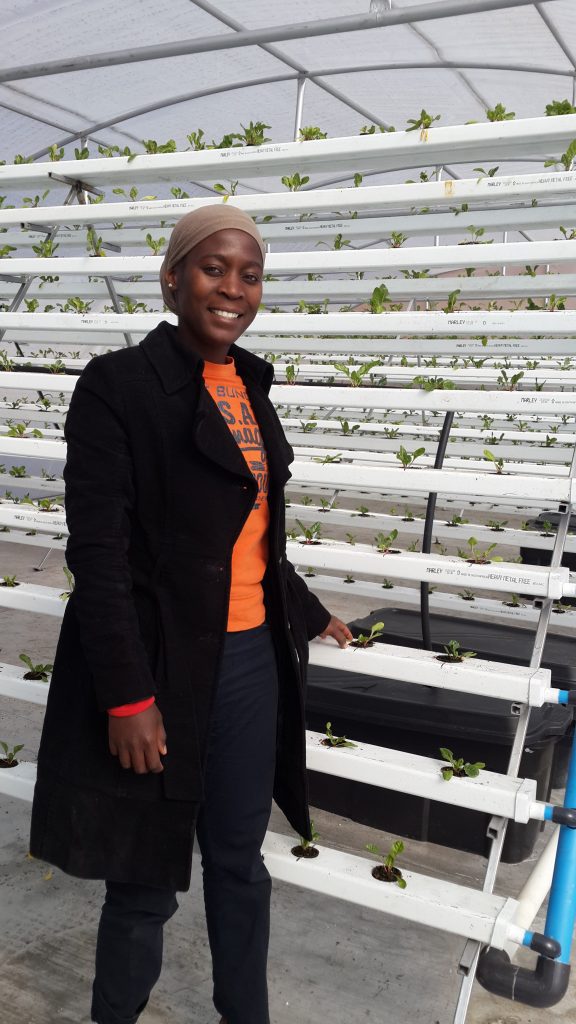
There’s green things sprouting high in the sky in the Joburg inner city.
hose things are spinach, basil and lettuce, planted in hydroponic farms on skyscraper rooftops as part of a project called the Urban Agriculture Initiative (UAI).
Thirty-three year-old Puseletso Mamogale diligently picks at tiny pots – each containing a single fledgling spinach seedling, arranged in A-fame racks of 10 shelves – like a mother nurturing her children. They’re three weeks old, she says. “In six weeks they’ll be ready for harvesting.” She already has a market for the plants, and will then plant her second batch.
The plants are grown in a medium that holds them upright while their roots reach through the pot into a tray below, filled with nutrient-rich water. Plastic sheet-roof tunnels keep them warm in winter, and protect them from storms and hail in summer. The sheeting can be rolled back to release heat.
Mamogale is a graduate of the Wouldn’t It Be Cool (WIBC) incubator, a programme that seeks to take young people aged 18 to 35 and to turn them into entrepreneurs. So far 22 entrepreneurs have been trained, and 25 are receiving training. It has as its mission to “foster job creation though the creation of an urban agricultural entrepreneurial ecosystem supporting young black, urban farmers”.
It aims to give young, unemployed people opportunities usually denied them by their lack of education and business networks. In the process it will make a dent on the unrelenting unemployment rates while at the same time giving people some form of food security.
It was launched in October 2017 with Nhlanhla Mpati’s garden, bursting with lush basil, on the roof of the Minerals Council South Africa building in Main Street. He started with 300 plants and in just over six months he had 1 000 plants eagerly waiting delivery to nearby restaurants. He calls his enterprise Gegezi Organics, and in just 66m² of rooftop space and 21 days he has produced 110kgs of basil.
Shortly after that, property management company Afhco created a large farm on its Stannop building. One of the rooftop farmers is Mapaseka Dlamini, whose garden overflows with gourmet lettuce and basil plants. She now employs four people and supplies restaurants in Maboneng.
Other farms are in Hillbrow and Newtown, with rooftops generously supplied by the Outreach Foundation, the Jozi Housing Company, and the Joburg Land Company. There are two farms on the rooftops of FNB Bank City in the CBD.
The training that entrepreneurs undergo is intense. Before they are given their starter packs of seedlings, pots, irrigation systems and pumps, they have to present a business model, with financial support from the WIBC.
Mamagale has tried her hand at other agri-ventures, planting fields in Walkerville and Hammanskraal outside Pretoria. It’s been hard work which hasn’t always been successful, but she is confident that this venture will work. “I have been taught to look for a market for my produce before I grow anything,” she says.
Each day, she spends two hours at her garden at 1 Fox Street, then goes to Pretoria to tend her half hectare field she has there. For the latter project, she got a loan to hire a tractor to plough the field. She has two women helping her.
“I always loved growing vegetables,” she smiles.
The goal for this year is that 60 people will be trained, with 25 farms flourishing on rooftops. Some 120 jobs should have been created, plus 280 part-time jobs. Agri-processing – like making pesto sauce – is a part of the vision, with nine agri-processing operations hopefully up and running by the end of the year. Long term it is hoped that 60 entrepreneurial businesses – some farms, some agri-processors – will have been created. And the initiative should see incubators set up in Tshwane, Alice and East London in the Eastern Cape, Durban, and Mbombela in Mpumalanga.
The UAI has been developed by the Johannesburg Inner City Partnership (JICP) with support from the City of Johannesburg, the Department of Small Business Development, the Small Enterprise Development Agency, and SAB Kickstart.
One of the initiators of the UAI, Dr Michael Magondo from WIBC, believes that the “UAI is not about putting the farm on the roof, it’s about the lives that can be changed.”
